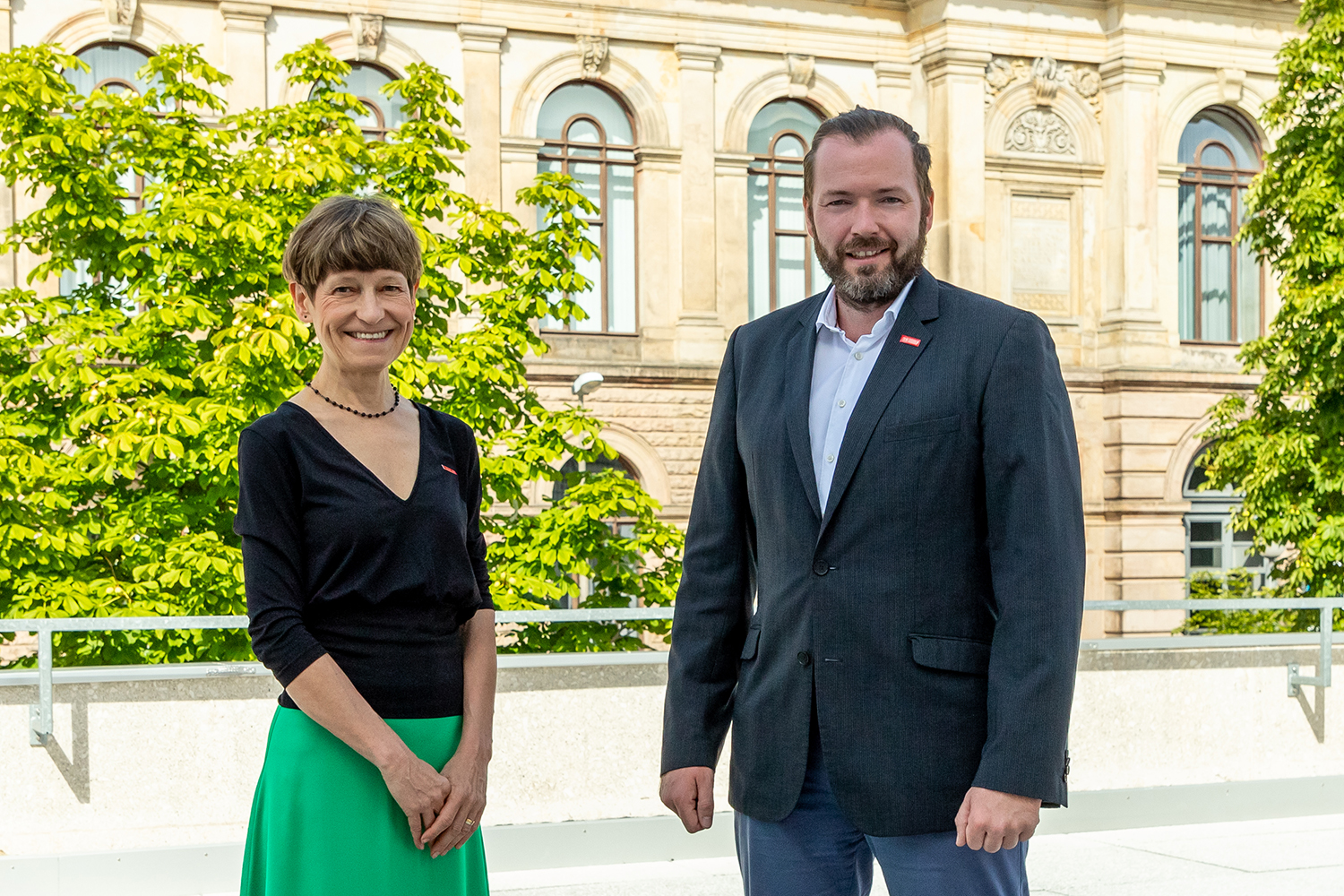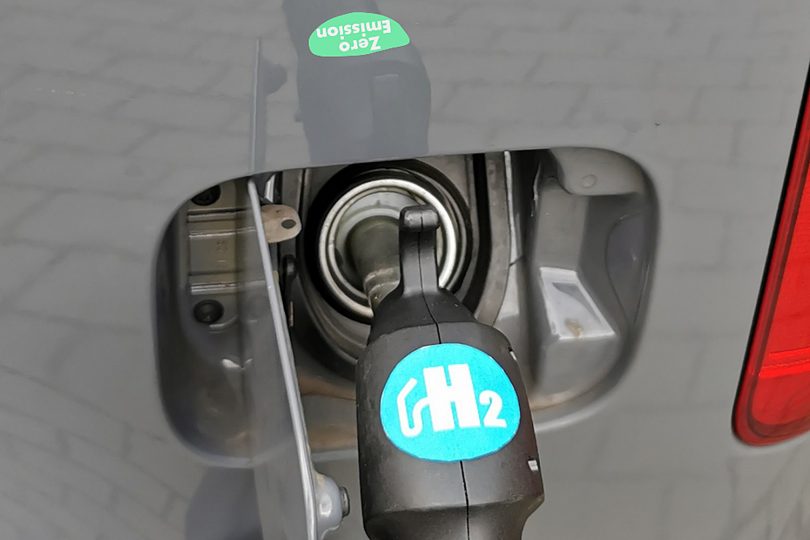“I am fighting for many solutions in climate-neutral mobility”
Michael Heere has been a junior professor at Technische Universität Braunschweig since March 2022, more specifically at the Institute for Internal Combustion Engines. With the planned phase-out of petrol and diesel engines from 2035 (for new passenger cars and light commercial vehicles up to 3.5 tonnes), the institute is reorienting itself. Professor Heere wants to help shape this path – through his research on fuel cells, which are being tested for various applications. And also through diverse mobility concepts with and without cars. Here he answers our questionnaire and introduces himself, his research projects and ideas in teaching.

President Prof. Angela Ittel and Prof. Michael Heere, photo credit: Kristina Rottig/TU Braunschweig
Professor Heere, have you settled in well at TU Braunschweig?
In a word, “yes” – after a good three months, my family and I have settled well in Braunschweig. The working environment at the NFF (out at the airport, that is) is certainly still quite new, but it is becoming more familiar day by day. In fact, I manage to cycle to work and also to the lecture in the city every day – that adds up to 25 kilometres. That’s when you realise how diverse the campus is. But the city is a great place for cycling.
Why did you choose TU Braunschweig?
Secretly, I always wanted to become a university teacher. The fact that it has now happened here is great, but it was also not predetermined. After graduating from high school, I enlisted as an officer cadet and also studied mechanical engineering there. Accordingly, I also wanted to do a doctorate after my Master’s degree, but that wasn’t granted to me – so I took the somewhat roundabout route: I left the Bundeswehr, had a short stopover at VW (Bertrandt) and then went to Norway on a Marie Curie scholarship to do my doctorate.
How would you explain your work to a person not familiar with your field?
I work with fuel cells. Here, a continuously supplied fuel (hydrogen) reacts with an oxidant (oxygen from the air) and produces water as waste gas, heat and electricity. This principle is also called cold combustion, which is definitely more efficient than today’s hot combustion technology. Accordingly, although I come from a mechanical engineering background, I also worked in physical chemistry for many years. For example, I also worked for a long time as a “beamline scientist”, where you make a certain method (neutron powder diffraction) accessible to other scientists and do an experiment together with them. I plan to do something similar here: Above all, we want to build up test bench capacities in the area of different performance classes of fuel cells, which can then be used by users from industry, by ourselves and by TU Braunschweig.
In one sentence: We will test fuel cells for various applications and integrate them into an overall system. This involves questions of material flows, heat conduction, but also of course degradation, “exhaust gas” analysis and system integration.
In view of the EU’s ban on combustion technology, we will all see ourselves undergoing a transformation, and so the tasks of the Institute for Internal Combustion Engines will also expand in the direction of fuel cells.
Where do you think the fuel cell will be used in the future? How application-oriented is your research?
My favourite quote is: “Don’t fight what you hate, save what you love” from Star Wars. Accordingly, I want to fight with my team above all to ensure that there will be many solutions for climate-neutral mobility in the future to mitigate climate change. For me, this also includes those that do without cars – such as e-bikes and hydrogen cargo bikes. In terms of cars, the battery car has a clear advantage right now, and it’s super efficient. Kudos to you! But there are also other factors that people are interested in. Some might want to go on holiday to Tuscany and only “refuel” every 500 to 600 kilometres in three to five minutes. That is already possible with hydrogen. Similar to the battery-powered car, the range record for the hydrogen car is also in the order of 1000 kilometres (with significantly shorter refuelling times afterwards).
Or in the area of large cities: here, too, there are many questions. We lived in Munich for a very long time and had an underground car park with a good 200 cars – but the house capacity was already exhausted, which meant that wallboxes were not permitted. Here, too, concepts are needed to further expand our current filling station network, also in terms of fast-charging capability for batteries or hydrogen, because no one will voluntarily walk the kilometre to the next charging station every day – a similar example is certainly all the hybrid service vehicles that are never or rarely charged – people are just too comfortable – that’s where we have to start.
What will be your first project here at the Institute?
One of our first projects will be an e-scooter project, in which we convert battery-powered scooters to hydrogen. This is primarily intended for Master’s, Bachelor’s and student theses – a project for the student body, also to ride and experience. Of course, I am also aware that a hydrogen-powered e-scooter will not catch on at the current prices for battery-powered models.
But there are also other countries, other sets of requirements. In India, it is sometimes still important to be able to connect the gas bottle from the scooter for cooking in the evening – this is possible with propane/butane, but is more difficult with hydrogen and does not work at all with pure battery solutions. This example is only meant to show that we are always talking about Germany with its 83 million people. India has a population of about 1.4 billion and sells an estimated 15 million scooters and motorbikes a year. To compare: in Germany, there were about 200,000 motorbikes in 2021.
What are the main research areas and projects you will be working on at TU Braunschweig?
Of course, I’m primarily working on the NFF, so my topics will mainly involve ground-based mobility. But I will also be actively involved in the Cluster of Excellence SE2A and try to acquire funds to set up simulation-based models for aviation. A good keyword here is machine learning – how much data do I actually need before an algorithm can credibly predict whether my fuel cell will need maintenance in the next 1000 hours? Here we have already been able to gather some preliminary experience with researchers from the KIT in Karlsruhe and China, which I would like to share. (J. Zhu, et al., Nature communications, 2022, https://doi.org/10.1038/s41467-022-29837-w)
What was your best experience as a scientist? What excites you about your research?
I’ve been working in science for almost ten years now, and what still fascinates me the most is that you can think up even the smallest questions and research them over years in a strong network with other scientists. Because science is always a team effort. And then there are people who have been asking themselves exactly the same thing for years – fascinating!
My best experience was actually the time during my doctorate. Through the EU-funded project “Ecostore”, I was able to go to Oslo in Norway and deepen my research in the field of metal hydrides. This time was, of course, full of hardship, stressful but also educational. During the three years, I spent about nine months outside the country – two months in England, Denmark, France, but also in Japan, the USA and of course in the rest of the EU – partly for research stays or seminars, conferences or Young Researcher Workshops. Really a dream for every doctoral student! But naturally also a nightmare for any family. My wife and I survived it and now our little daughter is happy every day that we all live together.
You place a very high value on team work.
Absolutely! Another example: Following my PhD, we, the 13 prospective researchers, set ourselves the task of writing and publishing a review article – which was also a great challenge. With a brilliant team effort, we managed to write a 75-page paper on the resulting research, completely without our supervisors – because that’s what you learn pretty quickly in science: you have to become and be independent (Hadjixenophontos, E., et al.; Inorganics, 2020. 8(3): p. 17. DOI:10.3390/inorganics8030017).
What constitutes good teaching for you?
Good teaching – a strong keyword: of course, that is always in the eye of the beholder. I can’t really judge whether I teach well, but I try out a lot of new things. For example, I came up with an online quiz to teach the historical aspects of hydrogen. According to the students’ feedback, that was at least better than just bluntly pushing the content into them.
I’m not that far away from the younger generation, or at least I imagine I am, and I never liked the frontal lectures myself that showed 150 slides in 90 minutes. I think that’s no longer in keeping with the times and I never went to such lectures myself. My limit is 30 slides for 90 minutes and I write a lot on the slides myself – of course there are sometimes boring parts, but I always try to spice up the lecture with videos and the like. At the moment, I am applying for new teaching materials and methods. I don’t want to reveal too much yet, but it will be exciting for the students and: There will be lots of puzzles to solve!
What else would you like to add?
I would also like to already express my gratitude for the enormous interest in the field of hydrogen here at TU Braunschweig. I believe that I took up the position at a good time. And I would also like to invite every student and staff member to simply contact me if they have any questions. We will be filling a lot of new positions here in the field of hydrogen and fuel cells, and we also always have the capacity to incorporate the strengths of the students in corresponding student research projects, Bachelor’s and Master’s theses.
I would also like to thank Faculty 4 and the Fraunhofer IST – without them, the purchase of a fuel cell test stand from VW AG would not have been possible, but it will be essential for the future research of my team here at TU Braunschweig! Thank you!

